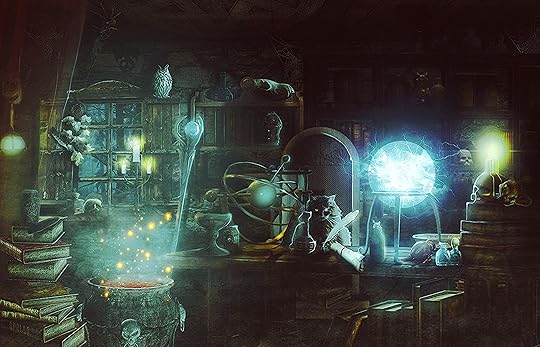Juho Pohjalainen's Blog: Pankarp - Posts Tagged "rime"
Rule Number One of Magic: There Are No Rules
Or to be perhaps a little less blunt and poetic... the rules for magic come from within, not without.

Great many fantasy writers, especially nowadays, love to develop complex magic systems, fancy and impressive and well-explained, spending a lot of time and pages to describe the way the wizard tosses the runestones or sings the song or speaks the true name or what have you. And I never saw the point in this sort of a thing: it may seem like an attractive course of action on the surface, to flesh out and expand the most magical and fantastic thing in your world, to show the reader just how things work there and how it's different from our own mundane life... but what you're really doing is, you're wasting a great deal of time and effort and the reader's attention to make your world less magical.
You're taking things that should be Unknown, and making them Known. You're turning the Magic into Science: the kind of science that's quite impossible for us in real life to do, but science nonetheless. From the narrative standpoint, what really is the difference between tapping into the energies of the Wyrd (or whatever) that exists parallel to your world and that all magic is fueled by, then wriggling your fingers the right way, snapping your thumb and forefinger to create the spark, in order to cast the Fireball spell to burn your enemies – and pulling the trigger of your flamethrower to shoot the fuel out through the burning nozzle?

There is no difference.
This was a fairly exaggerated example, many of the magic systems rarely true to such extent, but you get the point. Each fact established about magic as a whole – where the magical energy comes from, whether wizards throw down runes or play music or whatever to create effects with it, how different runes or instruments or what have you play off of one another, etc. – binds it more and more to common reality, dulls out the fantasy and wonder, makes it more logical and understandable and predictable, cages it. Magic should fly free.
So, I avoid making such generalizations to the last: I never tell how all magic everywhere works. Instead, I tell how this one guy's magic works. This has numerous advantages for me:
First, I tend to enjoy character-based stories, rather than setting-based, so this keeps the priorities in the correct order. To develop some character's inidividual magical style, is to develop the character.
Second, it maintains the sense of wonder. You may know how this guy works his magic, but you have no idea how the next guy does it: each time you meet another wizard you'll have something to look forward to.
Third, it still binds them to the narrative with personal rules and limitations. To take the above Fireball example, one wizard may cast it with a wand made out of specific kind of wood, with specific kind of runes written in it; another one might cast it by yelling out a Sick Burn. If you want to defend yourself against the former guy, or to add narrative tension about his survival, snap his wand; to do the same for the latter, gag him.
You see a demonstration of this early on in The Straggler's Mask, where two wizards take out their wands and commit to a terrible and destructive arcane duel. Their different philosophies and powers are at the forefront the entire time:

(Incidentally, I'm really not a fan of how so much of magic art is so full of flash and color and lightning and other special effects. But that's a blog post for another day.)
The old man Melker has spent all his long life in formal theoretical study of the arcane, learning his art slowly and methodically from scrolls, grimoires, and sorcerers even older and wiser than himself. A common magic system is to attribute magic to a language, but here we take this approach to the extreme: to such logical and methodical sorcerers, every individual spell is a language of their own. You don't just learn the language of magic in general. You learn the language of Fireball. And you better learn it well before starting to fling the spell around, or else you might embarrass yourself by casting something stupid, and you'll always have an accent no matter what you do. (Going with this method, Ziad Fazah would be a legendary archmage!) Melker may have only a few spells, but he's had a long time to become fluent with each of them, casting them with practiced and precise competence and surprising flexibility.
The demonic witch-girl Rime, on the other hand, has no patience for such bullshit, and instead learned her art from the lips of demons and spirits. Their whispers don't involve much about the nitty-gritty details of whatever spells they taught her, rather just how to get things done quickly and efficiently. She is consequently extremely powerful for her age, having learned a lot of things very fast... but not necessarily very well. Virtually all of her magic comes with a heavy cost, whether material or spiritual or physical, or risk doing great deal more harm to her surroundings than she'd wish it to, or involve constantly maintained pacts and complex diplomacy with summoned demons and monsters. She wields it all with relentless, burning rage – she is at a constant risk of being destroyed by things she doesn't understand, but she's going to take a chunk of the world with her.
And they are only two. You can bet that every other wizard in the setting will have their own way of doing things. None of them truly know where the magic comes from, if indeed it all comes from the same place at all – some of them have theories, beliefs, but I'll never make the mistake of telling you which one is right.
There is one constant rule, I suppose, but it's not really a rule with magic as with everything in this world or theirs: all knowledge or power worth possessing is going to take a great deal of effort, time, or other cost to acquire. If you feel that something came too easy for you, then odds are good you haven't truly acquired it, and that it's going to do you far more harm than good.


Great many fantasy writers, especially nowadays, love to develop complex magic systems, fancy and impressive and well-explained, spending a lot of time and pages to describe the way the wizard tosses the runestones or sings the song or speaks the true name or what have you. And I never saw the point in this sort of a thing: it may seem like an attractive course of action on the surface, to flesh out and expand the most magical and fantastic thing in your world, to show the reader just how things work there and how it's different from our own mundane life... but what you're really doing is, you're wasting a great deal of time and effort and the reader's attention to make your world less magical.
You're taking things that should be Unknown, and making them Known. You're turning the Magic into Science: the kind of science that's quite impossible for us in real life to do, but science nonetheless. From the narrative standpoint, what really is the difference between tapping into the energies of the Wyrd (or whatever) that exists parallel to your world and that all magic is fueled by, then wriggling your fingers the right way, snapping your thumb and forefinger to create the spark, in order to cast the Fireball spell to burn your enemies – and pulling the trigger of your flamethrower to shoot the fuel out through the burning nozzle?

There is no difference.
This was a fairly exaggerated example, many of the magic systems rarely true to such extent, but you get the point. Each fact established about magic as a whole – where the magical energy comes from, whether wizards throw down runes or play music or whatever to create effects with it, how different runes or instruments or what have you play off of one another, etc. – binds it more and more to common reality, dulls out the fantasy and wonder, makes it more logical and understandable and predictable, cages it. Magic should fly free.
So, I avoid making such generalizations to the last: I never tell how all magic everywhere works. Instead, I tell how this one guy's magic works. This has numerous advantages for me:
First, I tend to enjoy character-based stories, rather than setting-based, so this keeps the priorities in the correct order. To develop some character's inidividual magical style, is to develop the character.
Second, it maintains the sense of wonder. You may know how this guy works his magic, but you have no idea how the next guy does it: each time you meet another wizard you'll have something to look forward to.
Third, it still binds them to the narrative with personal rules and limitations. To take the above Fireball example, one wizard may cast it with a wand made out of specific kind of wood, with specific kind of runes written in it; another one might cast it by yelling out a Sick Burn. If you want to defend yourself against the former guy, or to add narrative tension about his survival, snap his wand; to do the same for the latter, gag him.
You see a demonstration of this early on in The Straggler's Mask, where two wizards take out their wands and commit to a terrible and destructive arcane duel. Their different philosophies and powers are at the forefront the entire time:

(Incidentally, I'm really not a fan of how so much of magic art is so full of flash and color and lightning and other special effects. But that's a blog post for another day.)
The old man Melker has spent all his long life in formal theoretical study of the arcane, learning his art slowly and methodically from scrolls, grimoires, and sorcerers even older and wiser than himself. A common magic system is to attribute magic to a language, but here we take this approach to the extreme: to such logical and methodical sorcerers, every individual spell is a language of their own. You don't just learn the language of magic in general. You learn the language of Fireball. And you better learn it well before starting to fling the spell around, or else you might embarrass yourself by casting something stupid, and you'll always have an accent no matter what you do. (Going with this method, Ziad Fazah would be a legendary archmage!) Melker may have only a few spells, but he's had a long time to become fluent with each of them, casting them with practiced and precise competence and surprising flexibility.
The demonic witch-girl Rime, on the other hand, has no patience for such bullshit, and instead learned her art from the lips of demons and spirits. Their whispers don't involve much about the nitty-gritty details of whatever spells they taught her, rather just how to get things done quickly and efficiently. She is consequently extremely powerful for her age, having learned a lot of things very fast... but not necessarily very well. Virtually all of her magic comes with a heavy cost, whether material or spiritual or physical, or risk doing great deal more harm to her surroundings than she'd wish it to, or involve constantly maintained pacts and complex diplomacy with summoned demons and monsters. She wields it all with relentless, burning rage – she is at a constant risk of being destroyed by things she doesn't understand, but she's going to take a chunk of the world with her.
And they are only two. You can bet that every other wizard in the setting will have their own way of doing things. None of them truly know where the magic comes from, if indeed it all comes from the same place at all – some of them have theories, beliefs, but I'll never make the mistake of telling you which one is right.
There is one constant rule, I suppose, but it's not really a rule with magic as with everything in this world or theirs: all knowledge or power worth possessing is going to take a great deal of effort, time, or other cost to acquire. If you feel that something came too easy for you, then odds are good you haven't truly acquired it, and that it's going to do you far more harm than good.

Published on June 08, 2019 16:22
•
Tags:
magic, magic-systems, melker, overdesigning, pet-peeves, rime, rules, science, wizards, worldbuilding
GATE OF DJAU OPENS! New book in the Umbrakin series!
Five years I've been working of this! It feels good to have it out at last.

If you like cosmic conflicts, clash of magic and technology, grey moralities, and big dogs, science-fantasy in the vein of Moorcock, you might want to give this one a go. You can buy it right now, if you want to support me and what I'm doing here, or if you wait until tomorrow you'll get to have it for free. I don't mind. I just hope you like it.
Grab it here!
Peal is not strictly speaking the main character this time, but that's my secret: Umbrakin can be a plural.

If you like cosmic conflicts, clash of magic and technology, grey moralities, and big dogs, science-fantasy in the vein of Moorcock, you might want to give this one a go. You can buy it right now, if you want to support me and what I'm doing here, or if you wait until tomorrow you'll get to have it for free. I don't mind. I just hope you like it.
Grab it here!
Peal is not strictly speaking the main character this time, but that's my secret: Umbrakin can be a plural.
Pankarp
Pages fallen out of Straggler's journal, and others.
Pages fallen out of Straggler's journal, and others.
...more
- Juho Pohjalainen's profile
- 352 followers



